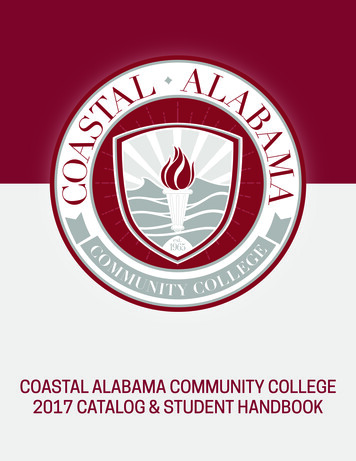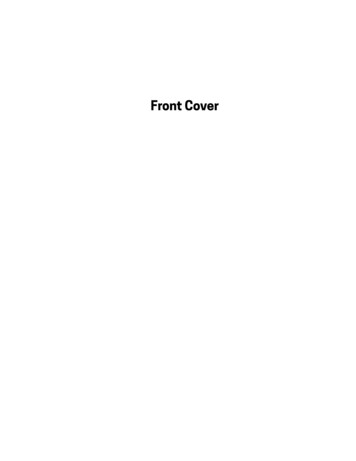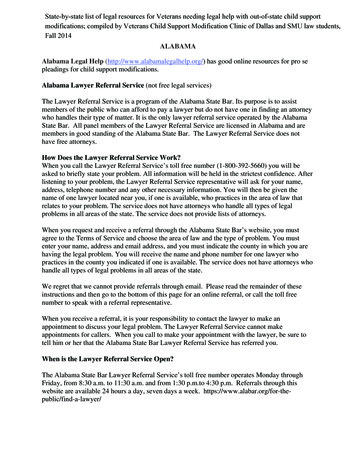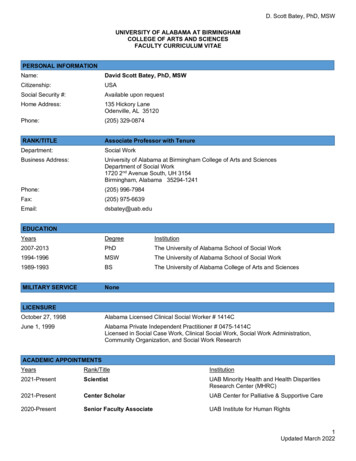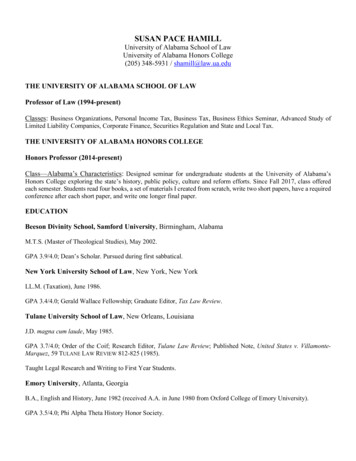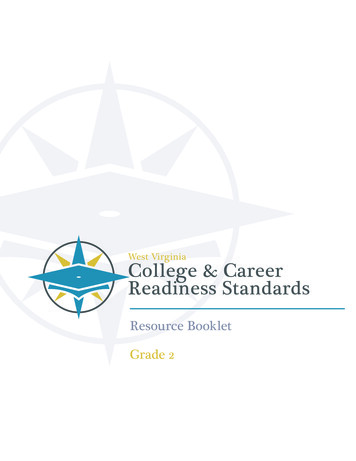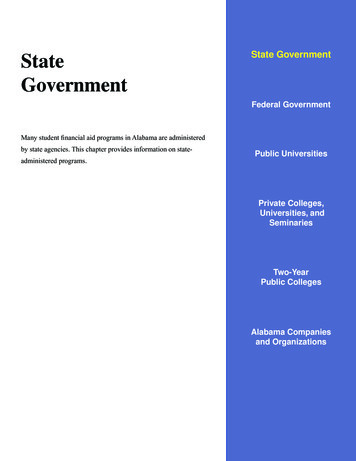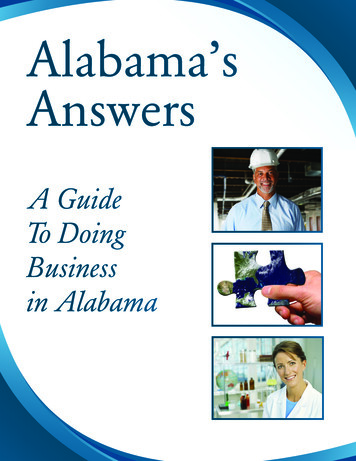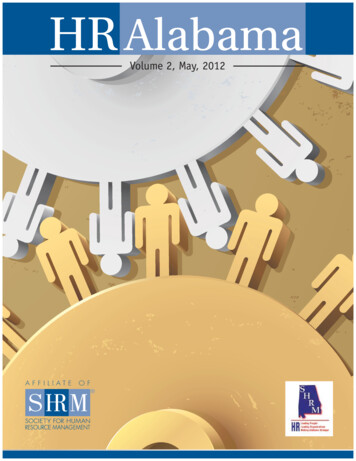
Transcription
a First Class Pre-KAlabama School Readiness AlliancePRE-K TASK FORCE2014 RECOMMENDATIONAs part of its Pre-K Task Force's goal to ensure that all families have access to high-quality, voluntary pre-k withinthe next ten years, the Alabama School Readiness Alliance recommends increasing state investments inFirst Class by 12.8 million. This would bring total First Class Pre-K investments to 41.3 million for FY15.A 12.8 millionincrease would.For 7openhelp enrollnew classroomsadditional four-year-oldsyears in a row,But only 9%of four-year-olds inAlabama have accessto the program.Alabama’s First Class Pre-Khas been ranked #1 in thecountry for quality.Alabama First Class Pre-K alums. are ready for kindergarten test proficient in reading have higher attendance rates are less likely to require special education placement are less likely to repeat grades12333Additional research has shown that childrenthat attend high-quality pre-k programs are: more likely to graduate more likely to attend college2020 more likely to succeed in the workforceRecommendations forless likely to rely on social welfareprogramsEXPA N S I O N O F– less likely to commit a crime–First Class Pre-K closesthe achievement gap forthelower income students byan average of 25%and by as much as 29%.45First Class Pre-Kin Alabamainvested in high-quality pre-k now saves taxpayers up toin the future.6At the end of their year in First Class Pre-K, students surpass national expectations in vocabulary assessments (Alabama Department of Children’s Affairs, 2011).Last year, 100% of Alabama third graders that attended First Class Pre-K scored proficient in reading (Governor Robert Bentley, State of the State Address, 2014)Governor Robert Bentley, State of the State Address, 20144Public Affairs Research Council of Alabama. The PARCA Perspective, October 20135Committee for Economic Development, The economic promise of investing in high-quality preschool: Using early education to improve economic growth and the fiscal sustainability of states and the nation, 2006.6Wat, A. (2007). Dollars and Sense: A Review of Economic Analyses of Pre-K. Pre-K Now, Washington, D.C.123Alabama SchoolReadiness Alliance1
Welcome to thePre-K Task Force Recommendations for theExpansion of First Class Pre-K in AlabamaDeveloped in 2012. Revised for the 2020 Legislative SessionIn 2011, the Alabama School Readiness Allianceformed a statewide Pre-K Task Force to growconnections among pre-k champions and identifystrategies to increase state investments in high-quality,voluntary pre-k. Members of the task force cametogether to study pre-k research, best practices andcost estimates.The Pre-K Task Force’s recommendations outlinea vision for expanding Alabama’s high-quality,voluntary First Class Pre-K program so that all familieshave the opportunity to enroll their four-year-olds.To accomplish this goal, the Pre-K Task Force hasrecommended increasing the level of state investmentin First Class Pre-K to 200 million over a ten-yearperiod, beginning in 2013-2014 and culminating in2022-2023.About the Alabama School Readiness AllianceThe Alabama School Readiness Alliance is a statewide, nonprofit coalitionadvocating for the expansion of high-quality, voluntary pre-k. ASRA was formedin 2006 as a joint campaign of A Education Partnership, Alabama Giving,Alabama Partnership for Children and VOICES for Alabama’s Children.2
652WITHACCESSWITHOUTACCESSFirst ClassPre-K Classroomsin Alabama12,00047,000to a First Class classroomachievement gap without First Class Pre-KFor 1325%in aonlyThat’syearsrow,20%!ement gap reduction with First Class Pre-Kachievement gap without First Class Pre-KAlabama’s First Class Pre-K has beenievement gap reduction with First Class Pre-K%25countryranked #1 in thefor quality.of four-year-olds in Alabamahave access t o the program.2 0 2 0 R E C O M M E N D AT I O N 200MIncrease First Class Pre-KInvestments by 25 Millioninvested in First Class Pre-Kaxpayers up toonBut only 37% 175M 150Min the future.We supportGovernor Ivey’s proposal to increasestate investments in First Class Pre-K by 25 million 100Mduring the 2020 Legislative Session. This increasewill help keep our state on track to fully fund the 75Mprogram by the 2022-2023 school year.A 25million increase would.add at least160new classroomsadd approximately242new classrooms2020-2021In 25 millio crease GoalnCurrent fund 122.8 mil inglionhelp enroll at least 50M 25M2,880additional four-year-olds 0help enroll approximately4,356additional four-year-olds3
TASK FORCE MEMBERSAlabama School Readiness Alliance Pre-K Task ForceConnecting pre-k champions in AlabamaCo-ChairsMike LuceVice Chairman, HarbertManagementBob PowersPresident, The Eufaula AgencyMembersCarolyn Akers,Executive Director, Mobile AreaEducation FoundationDee Ard,Retired Head Start, Pre-K andHome Visiting LeaderJeremy L. Arthur,President & CEO, Chamber ofCommerce Association of AlabamaFlorence Bellamy,Past President, AlabamaAssociation of School BoardsTommy Bice,Education Director, Mike & GillianGoodrich FoundationJeanie Box,Orlean Bullard Beeson School ofEducation, Samford UniversityMelanie Bridgeforth,President & CEO, The Women’sFund of Greater BirminghamJacqueline Brooks,Superintendent, Macon CountySchoolsJeanna Bulman,Pharmacist and Parent, OrangeBeachMolly Cagle,Jerry Courtney,Barbara Larson,Dionne Rosser-Mims,President and CEO, Heart of theValley YMCA (Huntsville)Development Associate, PublicAffairs Research Council ofAlabamaDean, Troy University College ofEducationLinda Lee,Executive Director, AlabamaPossibleNikki Thomas Davis,Executive Director, Alabama CivilJustice FoundationThaylee Dickerson,Pastor, United Christian Church(Prattville)Mark Dixon,President, A EducationPartnershipDavid Donaldson,Vice President, Governmental &Community Relations, VulcanMaterials CompanyMatthew Durdin,Director of External Affairs,Alabama Farmers FederationWalter Gonsoulin,Superintendent, Jefferson CountySchoolsGillian Goodrich,Trustee, Mike and Gillian GoodrichCharitable FoundationJames Harrison, Jr.,Chairman and CEO, Harco Drug,RetiredLiz Huntley,Associate, Lightfoot Franklin &White, LLCKay Jennings,Executive Director, TCR Child CareCorporationJohnny Johns,President and CEO, Protective LifeVice President of GovernmentalAffairs, Business Council ofAlabamaShelley Jones,Leslie Carlisle,Maria Kennedy,Carlisle & Associates: PhilanthropyConsulting, LLC (Rotary Club ofBirmingham Representative)Jeff Coleman,President and CEO, Coleman WorldGroupCommunity Volunteer and RetiredElementary School PrincipalExecutive Director, DanielFoundation of AlabamaPaul Kennedy,President, Walker Area CommunityFoundationDrew Langloh,President, United Way of CentralAlabama4Executive Director, AlabamaChapter – American Academy ofPediatricsJay Love,Former State Representative;Finance Chairman, BusinessEducation AllianceHarriet Renorda McFarlin,Kristina Scott,Jimmy Shaw,Superintendent, Florence CitySchoolsAnn Sikes,Executive Director, MontgomeryEducation FoundationPast President, Alabama Head StartAssociation; Region IV Head StartAssociation Board of DirectorsSally Smith,Frank “Trippy” McGuire,Zeke Smith,Executive Director, AlabamaAssociation of School BoardsRetired District Judge, CovingtonCountyExecutive Vice President, AlabamaPower CompanySue McInnish,Christie Steigerwald,Retired Executive Director, AlabamaCivil Justice FoundationOwner, Kid Plus Learning Center,FoleyMaurice Mercer,Erin Stephenson,Entrepreneur and Pelham CityCouncilmanVP, Client and CommunityRelations Director, PNC BankJoseph B. Morton,Jera Stribling,Chairman and President,Business Education AllianceExecutive Director, Joseph S.Bruno Charitable FoundationCaroline Novak,Lissa Tucker,Retired Founding President, A Education PartnershipJim Page,Director of Governmental Relations,Alabama Association of SchoolBoardsPresident and CEO, Chamber ofCommerce of West AlabamaLeila Watson,Major General Butch Pair,James C. Wiley, MD,US Army, RetiredBarbara Patton,Retired Opelika Chamber Presidentand former Mayor of OpelikaMartha Peek,Former Superintendent (Retired),Mobile Public SchoolsGail Piggott,Executive Director, AlabamaPartnership for ChildrenRobbie Roberts,Executive Director, Harris EarlyLearning CenterAttorney, Cory Watson AttorneysFounder of FOCUS Pediatric Clinic,MobileVic Wilson,Executive Director, Council forLeaders in Alabama Schools (CLAS)Stephen Woerner,Executive Director, VOICES forAlabama’s ChildrenJoan Wright,Executive Director, ChildcareResources
RECOMMENDATIONS2020 Pre-K Task Force RecommendationsWe recommend expanding Alabama’s high-quality, voluntaryFirst Class Pre-K program so that all families have theopportunity to enroll their four-year-olds. To accomplishthis goal, we recommend increasing the total level of stateinvestments for First Class Pre-K to approximately 200million by the 2022- 2023 school year.2020 LEGISLATIVE PRIORITY:Increase First Class Pre-K Investments by 25 MillionWe support Governor Ivey’s proposalto increase state investments in FirstClass Pre-K by 25 million during the2020 Legislative Session. This increasewill bring the total level of funding forFirst Class Pre-K to 147.8 million, andkeep our state on track to fully fund theprogram by the 2022-2023 school year.We recommend that additional state investments in FirstClass Pre-K: prioritize expanding access to students at-risk of schoolfailure; encourage and leverage the use of local and privatematching funds; are sustainable and based on the true costs of a highquality program; and are guided by a statewide needs assessment reviewingsupply (available providers, facilities, workforce) anddemand (survey of Alabama parents to identify estimatedparticipation rate) for pre-k expansion. We also encouragestrategies to grow demand so that families whose childrenwould benefit from pre-k but who don’t realize itsimportance become potential pre-k consumers.We support the continued use of a “diverse delivery” fundingstructure for First Class Pre-K that creates high-quality, statefunded pre-k classrooms in public schools, Head Start andcommunity-based settings (such as child care, nonprofit andfaith-based centers). We recommend revised strategies andpolicies that strategically target areas in the state with lowerrates of First Class Pre-K access, and result in more First ClassPre-K programs being placed in community-based settings.We recommend that the Department of Early ChildhoodEducation continue to improve coordination with otherstate departments in order to ensure that resources areused efficiently and that First Class Pre-K is aligned withchild care improvement efforts; other early childhoodand family programs; and K-12 learning standards, datasystems, accountability and assessment.We recommend that the Department of Early ChildhoodEducation maintain the ten quality benchmarks for FirstClass Pre-K measured annually by the National Institutefor Early Education Research. All First Class providersmust adhere to the program’s quality standards andcoordinate with families and schools to facilitate children’ssmooth transition into kindergarten.We recognize that parents are their children’s firstand most important teachers. With that in mind, werecommend that First Class Pre-K continue to incorporateevidence-based best practices for meaningfully engagingand strengthening families.We recommend that the Department of Early ChildhoodEducation continue efforts to enhance and measurethe quality of First Class Pre-K. The quality of teachingshould be regularly observed and student outcomesshould be tracked over time through a high- quality,longitudinal program evaluation. This should include aplan to continue progress toward a statewide kindergartenreadiness assessment in all systems.While the state expands access to First Class Pre-K, wesupport local governments, private companies, charitableorganizations, and other state partners in their work toaddress school readiness gaps by investing in high-qualitypre-k and other evidence-based programs that improve theoutcomes of children pre-birth to age five, and their families.5
WHY PRE-KLESSLIKELYThe Public Affairs Research Council of Alabamaand the University of Alabama at Birminghamhave followed student progress throughthe eighth grade, and found that AlabamaFirst Class Pre-K students, regardless ofdemographics, zip code or school, are:MORELIKELYAlabama’s First Class Pre-K program has lasting results1to be proficient in reading and mathto be chronically absentto be held back a gradeto need special educationto have serious disciplinary issuesHigh-Quality Pre-K WorksAn abundance of research has shown that the academic “achievement gap” begins as a schoolreadiness gap.2 Moreover, brain science tells us that the first five years of a child’s life establish eithera sturdy or a fragile foundation for everything that follows—and getting things right the first time iseasier and less expensive than trying to fix them when a child is older.3High-quality, voluntary pre-kindergarten (pre-k) for four-year-olds is an effective early childhoodeducation program that prepares children to succeed socially, emotionally and academically inkindergarten and beyond.4Graduatesof a high-qualitypre-kpre-kprogramare:are:Graduatesof a high-qualityprogramMore likely to beproficient in readingby third gradeMore likely to graduatefrom high school andattend collegeMore likely to succeedin the workplace1 Alabama Department of Early Childhood Education, 2019, www.children.alabama.gov.2 Burkam, D., & Lee, V. (2002). Inequality at the starting gate: Social background differences in achievement as children begin school. Economic PolicyInstitute, Washington, DC.3 Shonkoff, J.P., & Phillips, D.A. (2000). From neurons to neighborhoods: The science of early childhood development. National Academy Press,Washington, DC.4 Committee for Economic Development (2006). The economic promise of investing in high-quality preschool:Using early education to improve economic growth and the fiscal sustainability of states and the nation. Washington, D.C.6
About ALABAMA’SFIRST CLASS PRE-KAbout Alabama’s First Class Pre-KFirst Class is Alabama’s state-funded pre-k program. The Office of School Readiness in the AlabamaDepartment of Early Childhood Education administers First Class Pre-K by providing funding andsupport for high-quality pre-k classrooms in a variety of settings.For more information, visit http://children.alabama.govPercentage of four-year-olds enrolled in First Class Pre-KBY 3%36% 0%26%77%40%14%BUTLER90% IAMOBILE33%43% NECUH61%28% LAS%40%TALLADEGA 4%46%61% 79%%34% KENSGREENEDEKALBST. ENCE%JACKSON35%COVINGTON46DALE37% 27%%GENEVA46%36%31%HOUSTONCounties with less than 37 percent accessCounties with 37 percent access or more7
ama First Class Pre-KAlabama School Readiness AlliancePRE-K TASK FORCESome of the companies and organizations represented on theAlabamaSchool ReadinessAlliance’s statewide Pre-K Task Force:2014RECOMMENDATIONAs part of its Pre-K Task Force's goal to ensure that all families have access to high-quality, voluntary pre-k withinthe next ten years, the Alabama School Readiness Alliance recommends increasing state investments inFirst Class by 12.8 million. This would bring total First Class Pre-K investments to 41.3 million for FY15.A 12.8 millionincrease would.For 7openhelp enrollnew classroomsadditional four-year-oldsyears in a row,But only 9%of four-year-olds inAlabama have accessto the program.Alabama’s First Class Pre-Khas been ranked #1 in thecountry for quality.Alabama First Class Pre-K alums. are ready for kindergarten test proficient in reading have higher attendance rates are less likely to require special education placement are less likely to repeat grades12333DanielAdditional research has shown that childrenThethat attend high-qualitypre-k programs are: more likely to graduate more likely to attend college more likely to succeed in the workforce– less likely to commit a crimeFont ITC Avant Garde Gothic FamilyPMS: Black,– less likely to rely on social welfare programs5GREEN:RGB: 0, 204, 56HEXADECIMAL: 006838CMYK: 90, 33,100, 25PANTONE: 7727c / 356uBLUE:RGB: 0, 109, 182HEXADECIMAL: 006838CMYK: 90, 55, 0, 0PANTONE: 7461c / 300uinvested in high-quality pre-k now saves taxpayers up toBirminghamRotary ClubFirst ClassPre-K closesthe achievement gap forlower income students byan average of 25%and by as much as 29%.4in the future.6At the end of their year in First Class Pre-K, students surpass national expectations in vocabulary assessments (Alabama Department of Children’s Affairs, 2011).Last year, 100% of Alabama third graders that attended First Class Pre-K scored proficient in reading (Governor Robert Bentley, State of the State Address, 2014)Governor Robert Bentley, State of the State Address, 20144Public Affairs Research Council of Alabama. The PARCA Perspective, October 20135Committee for Economic Development, The economic promise of investing in high-quality preschool: Using early education to improve economic growth and the fiscal sustainability of states and the nation, 2006.6Wat, A. (2007). Dollars and Sense: A Review of Economic Analyses of Pre-K. Pre-K Now, Washington, D.C.123CONTACT USAllison Muhlendorf, Executive DirectorP.O. Box 4433, Montgomery, AL 36103Phone: (334) alabamaschoolreadiness.org8
About the Alabama School Readiness Alliance The Alabama School Readiness Alliance is a statewide, nonprofit coalition advocating for the expansion of high-quality, voluntary pre-k. ASRA was formed in 2006 as a joint campaign of A Education Partnership, Alabama Giving, Alabama Partnership for Children and VOICES for Alabama's Children.

